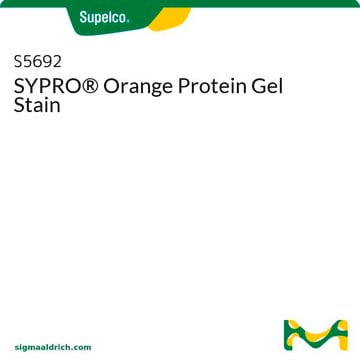Recommended Products
form
solution
storage temp.
room temp
Related Categories
General description
Coomassie Brilliant Blue stain is widely used for the detection of proteins in sodium dodecyl sulfate polyacrylamide gel electrophoresis (SDS PAGE). Staining with brilliant blue G is called as blue silver staining due to its improved sensitivity close to silver staining method. Coomassie Brilliant Blue G stain associates with proteins via hydrophobic interaction. It is effective in staining anterior capsule in cornea with relatively less toxic effects.
Application
Brilliant Blue G - Colloidal Concentrate has been used in the staining
- protein fragments post in vitro pepsin digestion
- ovarian tumor fluid proteome prior to profiling
- the transcription factor (TFIID) complex from Saccharomyces cerevisiae
Reconstitution
The suspension will contain 0.1% (w/v) Brilliant Blue G, 0.29 M phosphoric acid and 16% saturated ammonium sulfate after diluting to 1 liter with 800 mL water.
Analysis Note
This product has been tested for suitability on SDS-PAGE.
related product
Product No.
Description
Pricing
Signal Word
Warning
Hazard Statements
Precautionary Statements
Hazard Classifications
Eye Irrit. 2 - Met. Corr. 1 - Skin Irrit. 2
Storage Class Code
8B - Non-combustible corrosive hazardous materials
WGK
WGK 2
Flash Point(F)
Not applicable
Flash Point(C)
Not applicable
Certificates of Analysis (COA)
Search for Certificates of Analysis (COA) by entering the products Lot/Batch Number. Lot and Batch Numbers can be found on a product’s label following the words ‘Lot’ or ‘Batch’.
Already Own This Product?
Find documentation for the products that you have recently purchased in the Document Library.
Customers Also Viewed
Staining ability and biocompatibility of brilliant blue G: preclinical study of brilliant blue G as an adjunct for capsular staining
Hisatomi T, et al.
Archives of Ophthalmology, 124(4), 514-519 (2006)
V Neuhoff et al.
Electrophoresis, 9(6), 255-262 (1988-06-01)
An improved procedure for staining of proteins following separation in polyacrylamide gels is described which utilizes the colloidal properties of Coomassie Brilliant Blue G-250 and R-250. The new method is based on addition of 20% v/v methanol and higher concentrations
Julie Ducreux et al.
Bioconjugate chemistry, 19(10), 2088-2094 (2008-09-24)
PEGylation of antibodies is known to increase their half-life in systemic circulation, but nothing is known regarding whether PEGylation can improve the inhibitory potency of antibodies against target receptors. In this paper, we have examined this question using antibodies directed
A multi-laboratory evaluation of a common in vitro pepsin digestion assay protocol used in assessing the safety of novel proteins
Thomas K, et al.
Regulatory Toxicology and Pharmacology, 39(2), 87-98 (2004)
Roy Auty et al.
The Journal of biological chemistry, 279(48), 49973-49981 (2004-09-28)
The basal transcription factor TFIID is composed of the TATA-binding protein (TBP) and 14 TBP-associated factors (TAFs). Although TBP alone binds to the TATA box of DNA and supports basal transcription, the TAFs have essential functions that remain poorly defined.
Protocols
Brilliant Blue G-Colloidal Concentrate stains proteins in IEF, PAGE, and SDS-PAGE gels after electrophoresis, enhancing sensitivity with protein fixation.
Our team of scientists has experience in all areas of research including Life Science, Material Science, Chemical Synthesis, Chromatography, Analytical and many others.
Contact Technical Service








